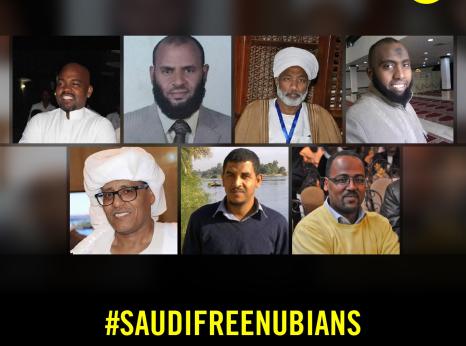Saudi Arabia: 10 Egyptian Nubian Men Sentenced To Prison

The 10 men were first arrested on the morning of an event they had planned on 25 October 2019 to mark the 1973 Arab-Israeli war, where they were interrogated by Saudi security officials who accused them of failing to include a photo of Egyptian President General Abdelfattah al-Sisi in the event’s announcement poster, alongside other Egyptian army generals. On 25 December, the men were released on travel ban pending the case’s resumption. The event has taken place in previous years in Saudi Arabia without any reprisals against the community.
The ten detained Egyptian Nubian men are: Adel Ibrahim Faqir (Head of the Nubian community in Riyadh) Dr. Farjallah Ahmed Youssef (Former Head of the Nubian community in Riyadh), Jamal Abdullah Masri (President of Dhamit Nubian Village Association in Riyadh), Mohamed Fathallah Gomaa, Sayyed Hashem Shater, Ali Gomaa Ali Bahr, Saleh Gomaa Ahmed, Abdulsalam Gomaa Ali Bahr, Abdullah Gomaa Ali and Wael Ahmed Hassan Ishaq (member of Thomas Nubian Village Association).
The SCC sentenced Mohammad Fathallah Gomaa to 18 years in prison, Dr. Farjallah Ahmed Youssef to 17 years, Adel Ibrahim Faqir to 14 years, and Sayyed Hashem Shater to 14 years. Six other men received sentences ranging between 10 to 16 years in prison.
The Nubians are a minority ethnic group in Egypt and Sudan and have been historically marginalized and discriminated against on the basis of their cultural, ethnic, and linguistic identity. In 1964, the Egyptian government forcibly displaced thousands of Nubians from their homes in southern Egypt, to build the Aswan High Dam which caused the flooding of several Nubian villages and further displacement. The displaced Nubian population resettled in other areas, and many migrated to the Arab Gulf countries, including Saudi Arabia, seeking work. To preserve their culture and heritage, the Nubian diaspora established Nubian cultural and social associations. For decades, Nubian associations have operated normally in Saudi Arabia, focusing strictly on cultural and social activities away from politics.
Since the early 2000s, Nubian activists’ demands for the return to their ancestral land and compensation accelerated. Article 236 of the 2014 Egyptian Constitution stipulated for the first time the implementation of a comprehensive development plan for marginalized areas including Nubia, with participation of local communities, with the view of preserving their heritage. To that end, a coalition of 40 Nubian associations was formed in Riyadh in early 2020 to call on Egyptian President Abdel Fattah al-Sisi to abide by Article 236 and allow the Nubians’ return to their homeland.
In 2017, the Egyptian authorities arrested 25 Nubian activists after the police violently dispersed their peaceful protest in Aswan governorate on 3 September 2017. They were later released and all charges against them dropped, noting that Gamal Sorour, one of the activists, died in custody. Amnesty International documented the continued harassment of Nubian rights activists by the National Security Agency (NSA) including through summons for coercive questioning without judicial orders in 2021.
In addition, the SCC routinely conducts trials that have been assessed as being grossly unfair and leading to harsh sentences including prison sentences up to 34 years to be followed by equally long travel bans, and going up to the death penalty, and has routinely been used as a tool to repress dissidents.